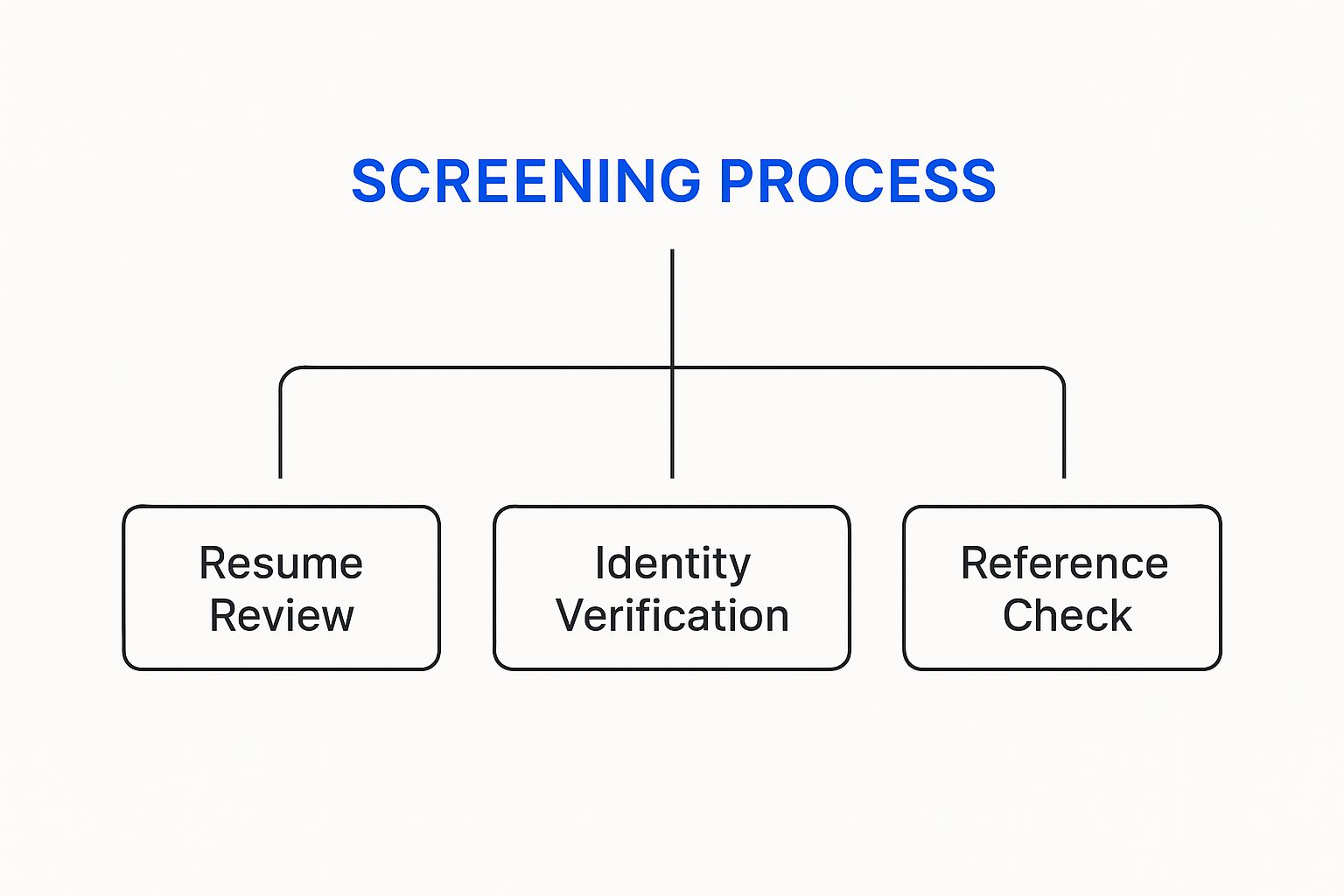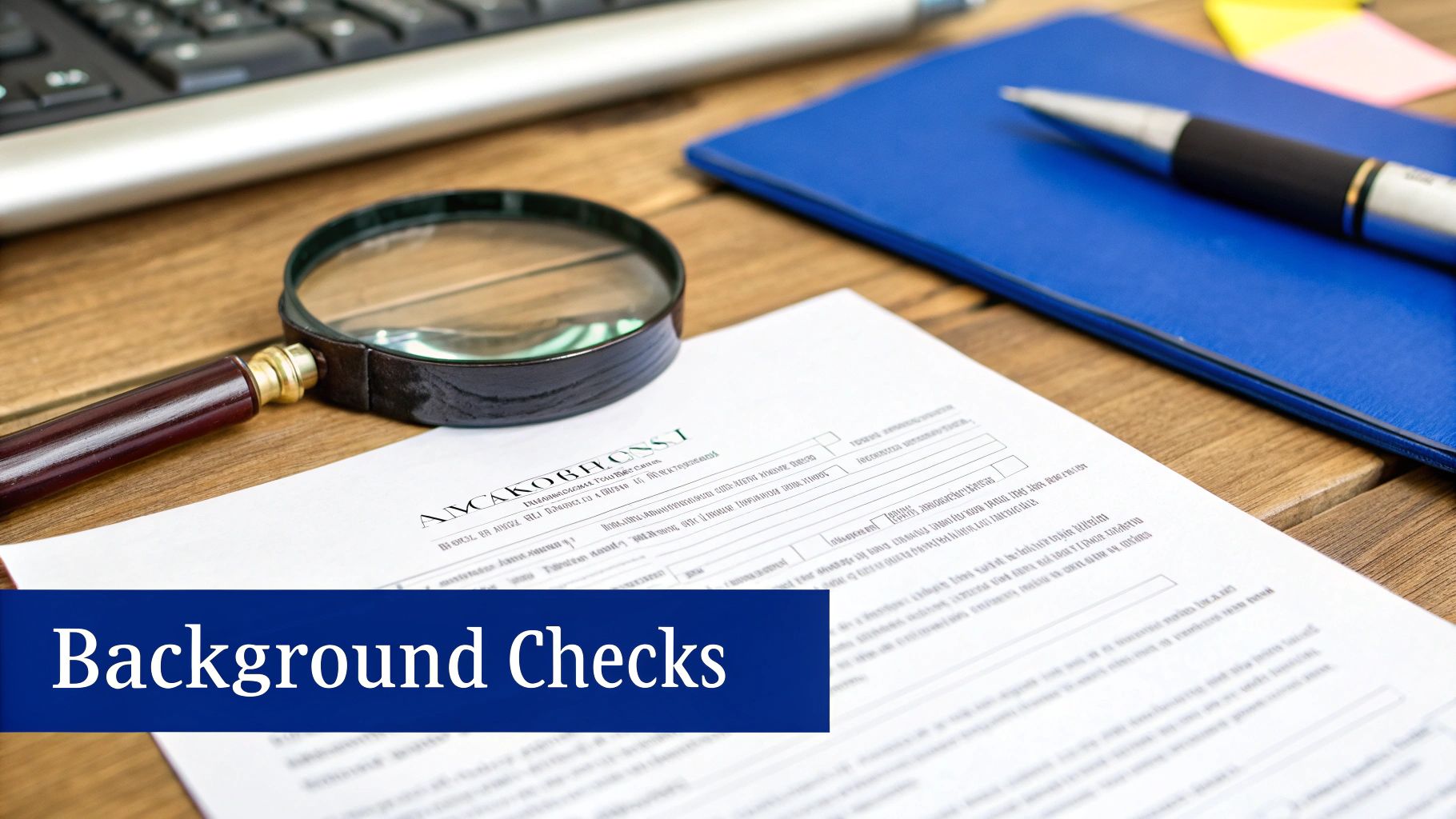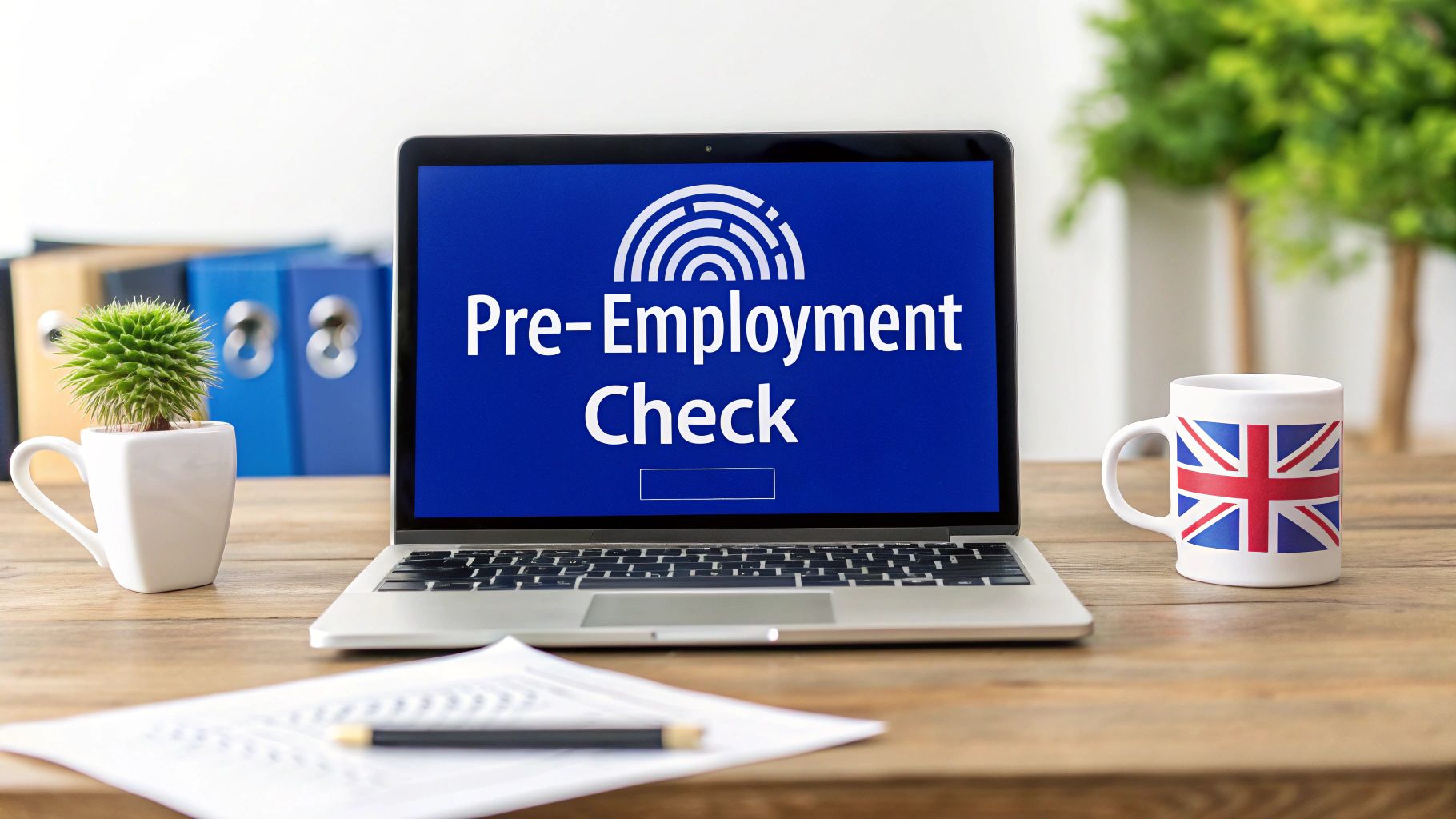So, what exactly is pre-employment screening? In simple terms, it's the process of thoroughly checking a job candidate's background to make sure the information they've given you is accurate. It’s a crucial step before you make that final job offer, helping you confirm their qualifications, work history, and even their identity.
Why Pre Employment Screening Is Non-Negotiable

Think of pre-employment screening not as a barrier for candidates, but as the very foundation of the trust you’re building with a new employee. It's about making sure the person you're about to bring into your team is exactly who they say they are and has the experience they claim.
This verification has become absolutely essential, particularly with the rise of remote work where you might never meet a candidate face-to-face. The goal is straightforward: to hire someone who is genuinely qualified, trustworthy, and a good fit for the role and your company culture. Before we get into the nuts and bolts of the screening itself, it’s worth understanding the bigger picture and the secrets to building a winning team.
Protecting Your Organisation’s Integrity
You wouldn't buy a house without getting a survey done, would you? That would be a huge gamble, leaving you open to discovering costly structural problems down the line.
Pre-employment screening is your company’s version of a property survey. It’s how you look beneath the surface to protect your business from some very real risks.
And these risks are more common than you might think. A recent report found that a staggering nine out of ten UK businesses discovered discrepancies on candidate applications during the screening process. These ranged from slightly embellished job titles to completely fabricated qualifications. This just goes to show that proper verification isn't just a "nice-to-have"—it's a business necessity.
A solid screening process is your first and best defence against things like internal theft, damage to your reputation, and serious safety issues in the workplace. It helps you shift from hiring based on hope to hiring based on solid evidence.
The following table breaks down the most common areas covered in a typical pre-employment screen, showing what each check confirms and why it's so important for your business.
Key Areas Verified During Pre Employment Screening
As you can see, each check plays a specific role in building a complete and reliable picture of your candidate, giving you the confidence to make the right hiring decision.
Building a Foundation for Success
By confirming a candidate's background and credentials, you establish a clear standard of honesty and integrity right from their first day. This simple act ensures that every new person you hire will add to, not detract from, your company culture and operational stability.
In short, effective screening helps you:
- Minimise Risk: Spot potential red flags before they turn into real problems for your business.
- Guarantee Quality: Be certain that your candidates have the skills and background they need to excel.
- Protect Your Brand: Avoid the fallout from hiring someone whose past could damage your company's reputation.
- Foster a Safe Workplace: Screen out individuals whose behaviour could put your team's safety at risk.
Ultimately, pre-employment screening isn’t just about ticking boxes on a checklist. It's a fundamental part of a strong and resilient hiring strategy, giving you the assurance you need to invest in your most important asset—your people.
The Core Components Of A Thorough Screening Process
A proper pre-employment screening isn’t a single, one-off check. It’s more like putting together a puzzle. Each piece—each individual check—gives you a clearer view of who your candidate really is. When you assemble them all, you get a much richer, more reliable picture than a simple CV could ever provide.
Think of it as a journey. You start with the application and then move methodically through different layers of verification.

As you can see, foundational checks like identity and references form the bedrock of a good hiring decision. Each element has a specific job to do, and together they create a robust process that verifies what a candidate has told you and helps you gauge their suitability for the role.
Verifying Identity and Right To Work
First things first: before you get too far down the road, you absolutely have to confirm a candidate’s identity and their legal right to work in the UK. This isn’t just good practice; it's a legal requirement for every employer. Getting this wrong can lead to serious penalties, so it's the one step you can't afford to skip. It ensures you're dealing with a real person who is legally allowed to do the job.
Confirming someone's legal right to work is a critical part of this. While the exact paperwork can vary, the core principle is the same everywhere. Many businesses use standardised employment eligibility verification forms like Form I-9 as a model to ensure their own internal processes are thorough and consistent.
Criminal Record Checks (DBS)
For many roles, especially those involving children or vulnerable adults, handling finances, or accessing sensitive data, a criminal record check is non-negotiable. Here in the UK, these are managed by the Disclosure and Barring Service (DBS), and it’s vital to choose the right level of check for the job.
- Basic DBS Check: This is the simplest check, revealing any 'unspent' convictions or cautions. You can request this for pretty much any role.
- Standard DBS Check: This goes a bit deeper, showing both spent and unspent convictions, cautions, and warnings. It’s typically used for positions of trust, like in law or finance.
- Enhanced DBS Check: This is the most comprehensive check available. It includes everything in a Standard check, plus any relevant information held by local police forces. It’s a must for anyone working with children or vulnerable adults.
Knowing the difference ensures your screening is both relevant and lawful. The goal isn't to pass judgment on someone's past but to responsibly assess any risks directly related to the role's duties.
A revealing study found that nearly 50% of employers discovered a candidate had a criminal record they hadn't mentioned. It’s a stark reminder of why formal checks are so much more reliable than simply asking someone to self-declare.
Employment History and Education Verification
Once you've confirmed who the candidate is and that they can legally work for you, it's time to check the facts on their CV. This means getting in touch with previous employers to confirm their job titles and dates of employment. It’s a straightforward but incredibly effective way to catch any exaggerations or outright falsehoods.
The same goes for their education. You need to verify that they actually earned the degrees, diplomas, or certifications they claim to have. For any job that demands specific technical skills or qualifications, this is an essential step to ensure you’re hiring someone with the right foundation. While these checks confirm facts, you can dig deeper into a candidate's real-world skills with the right talent assessment tools that measure actual performance.
Reference Checks and Specialised Screening
This is where you get the story behind the data. Reference checks provide the colour and context that other verifications can't. A conversation with a former manager can tell you volumes about a candidate’s work ethic, how they get along with colleagues, and what they’re really like to manage day-to-day.
Depending on the seniority or nature of the role, you might need to go a step further with more specialised checks:
- Credit Reports: For jobs with major financial responsibilities, a credit check can offer a glimpse into a candidate's financial judgment and integrity.
- Social Media Screening: A careful look at a candidate's public social media can give you clues about their professionalism. Just be sure to conduct this ethically and without letting unconscious bias creep in.
Each of these components adds another layer of insight, helping you build a complete, trustworthy profile of a candidate before you make that final offer.
Navigating The Legal Landscape Of UK Screening

Running pre-employment checks in the UK isn't a free-for-all. It's a field governed by a strict legal framework designed to protect the privacy and rights of every candidate. Getting this wrong can land your business in serious legal and financial hot water, which makes compliance non-negotiable.
Think of it like driving. You can't just jump in a car and head off; you have to follow the rules of the road. Speed limits, traffic lights, and rights of way are all there to keep everyone safe. UK screening laws are the "rules of the road" for hiring, ensuring you treat candidates fairly and handle their personal data with the respect it deserves.
At the very heart of these rules is the General Data Protection Regulation (GDPR), which has completely reshaped how UK organisations approach pre-employment screening.
Understanding GDPR And Data Protection
GDPR isn't just a set of guidelines; it's the law. It sets a high bar for how you collect, process, and store a candidate’s personal information, all built on a foundation of key principles you simply must follow.
GDPR fundamentally shifts the balance of power, putting candidates firmly in control of their own data. An employer is essentially borrowing this information for a specific, lawful purpose and must protect it with the utmost care.
Your screening process must be lawful, fair, and transparent. This means having a legitimate reason for every check, being upfront with candidates about what you’re doing, and ensuring the process isn't discriminatory. Navigating this legal maze means taking all data protection rules seriously. Thankfully, many resources are available to help you understand GDPR compliance and data protection, which is essential for handling sensitive applicant data correctly.
This commitment to data privacy is pushing UK organisations to invest more in secure practices. The future of background checks is leaning heavily towards technologies that guarantee encryption, secure data storage, and tight access controls to prevent any breach of sensitive candidate information.
To stay on the right side of the law, your process must include:
- Explicit Consent: You need to get clear, unambiguous consent from the candidate before starting any checks. This isn't a box-ticking exercise; their agreement must be freely given, specific, and informed.
- Data Minimisation: Only collect what you absolutely need for the role. Resist the temptation to ask for extra information that could be seen as intrusive or irrelevant.
- Secure Storage: You have a legal duty to keep all candidate data secure and confidential, shielding it from unauthorised access or accidental loss.
The Rehabilitation Of Offenders Act
Another critical piece of the legal puzzle is the Rehabilitation of Offenders Act 1974. This law dictates how you can—and, crucially, cannot—use information about a candidate’s past criminal convictions when making hiring decisions.
The Act essentially gives people with certain past convictions a clean slate after a set rehabilitation period. Once a conviction becomes "spent," the individual is no longer legally required to disclose it for most jobs.
This means you have to be extremely careful about the questions you ask and the checks you run.
- Relevance is Key: You should only consider convictions directly relevant to the role. A minor offence from years ago likely has no bearing on someone’s suitability for an office job.
- Basic vs. Standard/Enhanced Checks: For most roles, you can only ask about unspent convictions. It’s only for specific jobs, like those in finance or working with vulnerable people, that you are legally permitted to ask about spent convictions through Standard or Enhanced DBS checks.
- Fair Assessment: A conviction, even if it's relevant and unspent, shouldn't be an automatic "no." You must assess the risk fairly, considering the nature of the offence, when it happened, and how it relates to the duties of the job.
By understanding and respecting these legal boundaries, you can build a pre employment screening process that’s not only effective but also fair, ethical, and fully compliant with UK law. This protects your organisation from legal challenges and, just as importantly, builds a foundation of trust with every single candidate.
Adapting Your Screening For Remote Hiring
The move to remote and hybrid work has completely shaken up how we hire. This makes a solid pre-employment screening process more critical than ever. When you can’t meet a candidate in person, how do you build that same level of confidence? The answer is to adapt your verification methods for a workforce that isn't in the office.
Hiring someone you've only ever met through a screen brings new challenges. It becomes absolutely essential to have a process that can confirm a candidate's identity and qualifications with total confidence, no matter where they are. This isn't about adding extra red tape; it's about re-establishing the assurance that used to come naturally from a face-to-face meeting.
Modernising Your Identity Verification
In a traditional office setting, you'd likely ask to see a passport or driver's licence in person. For remote hiring, that process needs a digital counterpart that's just as secure, if not more so. This is where modern, tech-focused solutions really shine.
Digital identity verification tools are built for this exact challenge. These platforms typically use a combination of high-quality document scanning and biometric checks, like facial recognition, to prove a candidate is who they say they are. The process is usually quick, straightforward for the candidate, and gives you a much higher level of certainty than just glancing at a document over a video call.
By using biometrics, you're not just looking at a document; you are verifying the person holding it. This digital-first approach closes a significant security gap in remote hiring, ensuring the foundation of your screening process is solid.
This approach effectively translates the traditional in-person check into a secure and efficient digital workflow. It maintains the integrity of your process without creating a bottleneck in your hiring pipeline.
Managing The Logistics Of Remote Screening
Adapting your pre-employment screening for remote work involves more than just identity checks. The entire flow of logistics needs a rethink to work smoothly in a digital-only environment.
Here are a few key things to consider:
- Secure Document Management: You need a secure, central system for candidates to upload sensitive documents. Email is simply not secure enough for this. A dedicated portal ensures data is encrypted and handled in line with data protection laws like GDPR.
- Virtual Reference Checks: Running reference checks over video calls can be just as insightful as a phone call, sometimes even more so. It allows you to pick up on non-verbal cues and build a better rapport, which can lead to more candid conversations.
- Global Check Coordination: If you’re hiring people from other countries, you'll have to deal with different regulations and data sources. Working with a screening provider that has global experience can make this tangled process much simpler.
For a deeper look into creating an effective hiring process for a scattered team, our guide on proven remote hiring strategies offers some great insights that go hand-in-hand with a strong screening programme.
Ensuring A Seamless Candidate Experience
Finally, while your process needs to be thorough, it also has to be user-friendly. A clunky, confusing screening process can easily frustrate your best candidates, potentially causing them to walk away. The goal is to make verification feel like a normal, professional part of the hiring journey.
This means giving clear instructions, being open about the checks you're conducting, and using platforms that are easy to navigate, especially on mobile. A smooth screening experience reflects well on your company and sets a positive, professional tone right from the start. By thoughtfully updating your screening methods, you can hire the best people from anywhere with complete confidence.
Why Screening Should Continue After The Hire

So, you’ve made a great hire. It feels like the finish line, but really, it’s just the beginning of your risk management journey. A solid pre-employment screening gives you a vital snapshot of a candidate at one specific moment. But people change, and so do their circumstances.
Relying only on that initial check can leave your organisation with some serious blind spots. This is particularly true for regulated industries like finance or healthcare, or for any role with access to sensitive data, company funds, or vulnerable people. A one-time check tells you who someone was when you hired them, not necessarily who they are today.
This isn’t about creating a culture of distrust. Think of it as a logical and necessary part of your wider risk management strategy. It’s simply about upholding the same high standards of integrity and safety you established during the hiring process.
The Problem with a Single Snapshot
Let’s get real for a moment. Imagine you hire an accountant who, a year into the job, develops a gambling problem and falls into debt. Or think about a company driver who loses their licence after a string of motoring offences. A pre-employment screening could never have seen that coming.
Without some form of ongoing monitoring, these issues could fly under the radar until they erupt into a major incident—fraud, theft, or a serious accident. The simple truth is that the risks you screen for before someone joins can pop up at any point during their time with you.
A single background check is like taking one photo of a marathon runner at the starting line. It proves they were ready to compete at that moment, but it tells you nothing about their performance, potential injuries, or challenges they face throughout the race.
The need for rescreening is becoming more apparent in the UK. Research shows initial checks aren’t foolproof; some studies suggest over half contain false positives, while an eye-watering 90% have at least one false negative. This just reinforces the idea that a one-off screening is a snapshot, not a permanent seal of approval. You can read more about why UK businesses are making rescreening a critical strategy on Veremark.com.
Implementing a Fair Rescreening Policy
Putting a continuous screening programme in place needs to be handled with care and complete transparency. The aim is to protect the business, your clients, and your team—not to play "gotcha". A well-defined policy is the key to striking that balance.
For this to work, the policy must be communicated clearly to every employee right from the start. This is a perfect thing to cover during your onboarding process, setting expectations from day one. Our guide to effective employee onboarding best practices can give you a great structure for this.
Here are the cornerstones of a fair and transparent rescreening policy:
- Define the Scope and Frequency: Be crystal clear about which roles require rescreening and how often it will happen (e.g., annually, or every two years). This should always be tied directly to the level of risk the position carries.
- Be Transparent: Your employee handbook and employment contracts should spell out the rescreening policy. Make sure everyone understands what checks will be run and why they are necessary for their role.
- Ensure Consistency: Apply the policy the same way to all employees in similar roles. This is crucial for avoiding any hint of discrimination or unfair targeting. The rules must be the same for everyone in a specific risk group.
- Respect Privacy and The Law: Just like with pre-employment screening, all ongoing checks must comply with GDPR and other UK laws. You have to handle employee data securely and only run checks that are relevant and proportionate to the role.
By implementing a thoughtful, ongoing screening programme, you create a continuous loop of verification and trust. This proactive approach ensures your organisation stays protected from internal risks long after the initial hire, safeguarding your people, your assets, and your reputation.
Common Questions About Pre-Employment Screening
When it comes to pre-employment screening, both companies and candidates often have a lot of questions. Getting your head around the practicalities of the process helps clear up any confusion and makes sure everything runs smoothly and fairly for everyone. Let’s tackle some of the most common queries we see here in the UK.
Getting this right is crucial. When everyone understands the timeline, the rules, and what might happen, you start building trust from the moment a conditional offer is made. It stops screening from feeling like a mysterious hurdle and turns it into a transparent, professional step in the hiring process.
How Long Does Pre-Employment Screening Take in the UK?
The time it takes to complete a pre-employment screening in the UK really depends on how deep you need to go. There’s no single, standard timeframe.
A basic check, like confirming someone’s identity and their legal right to work, can often be wrapped up in just a couple of days. These are usually quick document-based verifications.
However, if you're running a more comprehensive screening that involves a DBS check, contacting several past employers, and verifying academic qualifications, you’ll need to be more patient. It's wise to budget for anywhere between one and four weeks for these more detailed checks to come back. The biggest hold-ups are almost always third parties – think universities or previous employers who can be slow to respond to information requests.
Our advice? Be upfront with candidates and give them a realistic timeline from the start. That kind of transparency goes a long way in keeping your best people engaged and preventing frustration while you wait for the checks to clear.
Can a Candidate Refuse a Screening Check?
In short, yes. A candidate absolutely has the right to refuse a screening check. But that decision will almost certainly affect their job application.
If a candidate says no, the company will likely withdraw any conditional job offer. Since screening is a standard part of verifying information and assessing risk, a refusal is usually a major red flag for an employer.
Legally, under GDPR, you must get a candidate's explicit consent before you start any background checks. So, if your company policy requires screening for a specific role and a candidate won’t give their consent, they’re essentially not meeting a condition of employment. This gives you a clear and perfectly legitimate reason to end their application.
What Happens if a Discrepancy is Found During Screening?
Finding a discrepancy in a pre-employment screening doesn’t automatically lead to a withdrawn job offer. How an employer reacts really hinges on what the issue is and how serious it is.
A small, honest mistake, like getting an employment end-date wrong by a month, can often be sorted out with a quick chat. Most employers are reasonable and understand that minor errors can happen.
On the other hand, a significant discrepancy is a much bigger deal. We’re talking about things like a fake degree, a made-up job title, or an undisclosed criminal record that’s directly relevant to the role. In situations like these, an employer will investigate and is very likely to pull the offer. UK employment law does require employers to act fairly, which means they must give the candidate a chance to explain the discrepancy before making a final decision.

